Menu

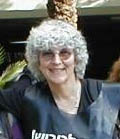
- Gila Svirsky
War, Nyet! Ceasefire, Da!
11 August 2006
Friends,
I figured there would be extra anger at us at the Women in Black vigil today, and there was. “I hope all your children will get killed and your house explodes too!” screamed one woman as she walked by.I think the fury rises in direct proportion to how Israelis think the war is going, and it is going very poorly indeed in public opinion: Only 20% of Israelis say that “Israel is winning”. These are the ones who are convinced by Olmert’s glorious view of the battlefield. Another 30% say, “Israel is not winning”…presumably because somebody else is. And 43% say that there’s no winner or loser. Like a tie in soccer, I suppose. [Data published in Ha’aretz 11 August]
Driving home, I tuned the radio to the easy listening music program, but there was no easy listening for me today. The celebrity host was telling listeners about the proposed ceasefire, and warning them, “If we have a ceasefire now and return the territory in dispute, that will reward terrorism, and then Syria will invade, knowing that it can also regain lost territory by going to war against Israel.” How many errors can you find in that sentence? The media are now filled with Israelis protesting that the proposed various ceasefire plans will not let us finish off the enemy.
A few items about war and peace:
Military Refusal in Israel
From a report by Sarah Anne Minkin and Rela Mazali: “…activist groups New Profile and Yesh Gvul report that hundreds, if not thousands, of reserve troops are refusing to go to the war. More than a hundred have turned to the groups for help in refusing to serve. While 5 refusers are currently in jail, with more awaiting trial for their refusal, the vast majority of refusers will not face immediate trial or punishment.” Why not? Report Sarah Anne and Rela: “…the majority of refusers are being told by their commanders to go AWOL, with punitive measures delayed for a later, less-urgent time. Refusers also report that many other men get out of service by going abroad, getting a medical deferral or simply going AWOL.” (Soon to appear on www.jewishvoiceforpeace.org)
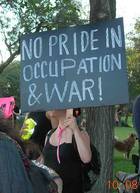
Pride and No-pride
At recent gay pride events in Israel, Queeruption held several successful happenings. On the left is a sign from one: No pride in occupation & war”. And on the right [under] is Shaul, a staunch peace activist, trying out his piano after a direct hit to his Haifa home by a Hizbullah-fired rocket destroyed just about everything except the piano. Shaul continues to come to the anti-war rallies (and his wife Ruthie is an active member of the Coalition of Women for Peace).
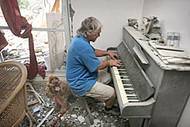
“They place military installations in the midst of their towns and villages”
This claim against Hizbullah is used by Israel to justify its bombing of Lebanese towns and villages. Now that makes me worry, as a huge number of Israel’s military installations are also in or near our populated areas. Marjam Hadar Meerschwam of New Profile (www.newprofile.org) writes that she “has a military plant at the foot of my road, and Gelilot army base a short walk away.” Rela Mazali, also of New Profile, writes, “My own house, in quiet suburbia just north of Tel Aviv, is 15 minutes walk from a major intelligence base in one direction and a major munitions plant in the other.” And did we mention that Israel’s Ministry of Defense (our Pentagon) is in the heart of crowded, downtown Tel Aviv? Both sides have a lot to learn about the rules of war.
Bulletin
I just heard that a peace activist was hit by a rubber bullet today at the weekly protest of the Separation Barrier in Bil'in. The websites say he has “moderate to serious head wounds.” I hope he’s okay.
Finally
I reprint below the translation of an article that just appeared in Ha’aretz (10 August). We’re very proud of these two young activists in the Coalition of Women for Peace.
Shalom / Salaam from Jerusalem,
Gila Svirsky
Translated from Ha’aretz, 10 August 2006
Voine – Nyet! Kharb – La! [“War – No!” in Russian and Arabic]
By Lily Galili
At the vanguard of the radical left protest against the war are two women – an Arab and an immigrant from the former Soviet Union – leading the demonstrations with “End the War” chants in Arabic and Russian.
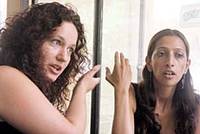
The evening before we met, Khulood Badawi [photo, right] escaped the horrors of war to go to the al-Hakawati Theater in East Jerusalem. But even escapism is not what it used to be. She was watching the Lebanese movie “The Kite”, directed by a friend’s sister, in which a young Lebanese woman falls in love with a Druze soldier from Israel during the first Lebanon War. At the height of the story, her cell phones began to ring. The news that Katyusha rockets had fallen on Haifa quickly moved through the theater. Badawi, who had lived in Haifa for several years, fled the theater to watch the TV news, where she recognized the offices of al-Ittihad, the newspaper of Hadash, Badawi’s political party. Among the ruins she saw many offices she knew, and began calling her friends. [photo from Ha’aretz by Guy Ravitz]
At that same moment, Yana Knopova [photo, left], who immigrated to Israel from the Ukraine 11 years ago as a young Zionist activist, was fielding phone calls to and from friends and colleagues. The rockets had fallen not far from the Haifa apartment she shares with Abir Kopty, the spokeswoman for the Mossawa Advocacy Center for Arab Citizens of Israel, and in the heart of the neighborhood of many Arabs and Jews who share her uncommon political path.
The two met the next day in what they call “the Tel Aviv bubble”, where they have been orchestrating the key protests against the war on behalf of the Coalition of Women for Peace and Ta’ayush. An Arab and a Russian. Another of the strange phenomena to emerge from this war.
The 30-year-old Badawi has a long history of political activism: The former militant chair of the Association of Arab University Students in Israel, Badawi is today a field worker for the Association of Civil Rights in Israel. The 25-year-old Knopova, a student of psychology at Haifa University [and coordinator of the Coalition of Women for Peace], strayed far from the Zionist dream though she had worked five years for the Jewish Agency,
In those years, she believed that “the left was only the Meretz Party”, as she put it, and then she discovered what she calls the lies and arrogance on which Israel is based, which not only create primitive men in Israel, but undermine the judgment of the entire country. Thus she found her way to a political and social home in the radical left.
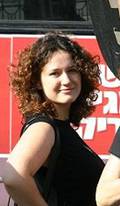
The Bomb and the Hope
Clearly the sense of marginalization in Israeli society – which views Arabs as the enemy and ignores immigrants – strengthened the solidarity between them. “The police see Khulood as a natural enemy,” says Knopova with a bitter smile; “while in the exact same situation, the police refuse to see me as an enemy. They also live with the stereotype that there are no Russians in the left. Khulood is always dangerous, I am never dangerous; Khulood is a demographic time-bomb, I am a demographic hope. This is an approach that regards the wombs of us both as in the service of the state, and we will not give them this pleasure.” [photo left of Knopova by Yair Gil]
Over the past month, they have orchestrated all the demonstrations of the left, and held them in three languages – Hebrew, Arabic and Russian. Based on the number of calls coming in to Badawi’s three cell phones, one would think that opposition to the war is the new consensus; based on the calls to Knopova in Russian throughout our conversation, one would think that a million Russian speakers in Israel changed their political views.
This is not true, of course, but there is no doubt that something different and new is happening. Much has already been said about the uniqueness of this war; the fact that at the vanguard of protest are two women – an Arab and an immigrant from the former Soviet Union – is without a doubt another unique element. Everything is new about this: Most of the protest in Israel, including that of the more left-wing activists, used to spring from the pool of Ashkenazi Jewish men. Not anymore. Today the protest of this war is being led to a large extent by women.
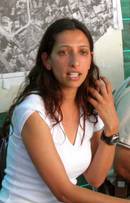
And that is not the only difference. In the past, Arab citizens of Israel refrained from going to demonstrations in Tel Aviv during a war. At most, they would make do with token representation in the later stages of protest. They would also generally hold their demonstrations in Arab towns. Not any more. From the very first week, the Arabs became equal partners to the demonstrations in Tel Aviv. Thousands of Katyusha rockets falling on them erased the reluctance of the past. In their eyes, this is no longer a Jewish war, but a civilian war in which they have an equal right to make themselves heard. Badawi says that they deliberately bring their voices to Tel Aviv, which is seen as the capital of Israel. [photo left above of Badawi by GS]
Another kind of change is transpiring among Russian speakers, considered the hard core of the Israeli right. Once, bringing a few Russian speakers to demonstrations of the Zionist left was considered a big achievement. Today there is a small, but visible and consistent participation of Russian speakers in the protest movement of the radical left. Thus, the Arabs are learning to chant “Voine – Nyet!” (no war), while Russian and Hebrew speakers are chanting “Salaam – Na’am!, Kharb – La!” (peace yes! war no!). It looks like this connection will last long after the voices of war subside.
The Old Left Failed
To Badawi and Knopova, all this seems quite natural. Above all, they feel that the role of women in this protest is obvious. “All the elements of this war bring the issues together – feminism, social justice, class distinctions, environment, and the occupation,” they say; “Women make this connection in a natural way. The Old Left, even Gush Shalom, has not managed to connect these struggles. We do. Even the social justice and political networks of women are stronger. This war is taking place on our social turf, in our homes. As women and citizens, we create an alternative voice of women facing the militant voice of men.”
“This is a male war about honor, both that of the Israel Defense Forces and the Hizbullah,” says Knopova. “Women are less into matters of honor. Russian women instinctively understand that this war is a man’s game. We grew up in that kind of society, and it’s obvious to us.” Perhaps this is why the group of Russian-speaking women in the radical left in Israel grew over a short period from 3 to 200 activists who are now involved in protest.
Knopova explains that even her father now visiting in Israel, a profoundly non-political person, “understood the lie” from watching the Israeli TV channel in Russian. Even he, reports Knopova, noted in amazement that one Israeli soldier seems to be worth the lives of ten Israeli civilians and a hundred Lebanese. “He feels instinctively that something is wrong,” she says, “but the Russians in Israel get brainwashed.”
“Human life is valued in Israel only when it is in uniform,” contends Badawi. “From our perspective, the struggle now is for the dignity of everyone in Israel. Every human being. Arab women have a common socio-economic interest with Russian and Mizrahi women. Our parents will have nothing left to eat after the war. When we speak from the stage – Yana in Russian, I in Arabic – that in itself is a political message. It also conveys to the Arab world that the claims by Israel and the U.S. that Jews and Arabs cannot live together is a false message.”
It is easy to elicit endless criticism from them about Israel, but harder to pry from them statements against the Hizbullah. “Clearly we as feminists cannot support a fundamentalist religious organization,” they agree, “but we do not want our statements to be used manipulatively against our views. Israel gave the Hizbullah reasons to attack, but our struggle is waged on behalf of our own society, to prevent a regional war that would hurt us all.”
Badawi says that this is also the beginning of a way to repair the fractured relations from the events of 2000 [when 13 Arab citizens were killed by the Israeli police], after which it was practically impossible to find Arab partners for political protest. “The age is over when we would accept Jewish partnership at any price,” she says. “Today the connection is genuine, with Jewish activists paying the price of their participation by demonstrations against the wall in Bil’in, refusal to serve in the military, activism at the checkpoints. We have a common fate, but it is different than in the past. These demonstrations can help us out of the severed relations of October 2000. Now the Arab-Jewish partnership is egalitarian.”
Only one area remains outside the joint space: the emotional memories. When Badawi talks about the evils of the Separation Fence, her personal baggage takes her back to 1948. Knopova agrees to every word, but has other associations from the collective Jewish memory. “I do not want Germans guarding us within the ghetto that we created for ourselves with the Separation Walls and security zones,” she says. “In the tragic evolution of Zionism, Israel has become the final solution of itself.” Perhaps this is not the text that will accompany the official lighting of torches on Independence Day in Israel, but it is the only moment when the thoughts of the two good friends part ways.
HOW TO MAKE A CONTRIBUTION
Contributions to the Coalition of Women for Peace help make it possible for us to carry out our work for peace.
You can make a donation in any of the following ways:
1) Make out a check to the “Coalition of Women for Peace”, and mail it to Coalition of Women for Peace, P.O. Box 10252, 91102 Jerusalem, Israel.
2) To our American friends: For a US-tax deduction, make out a check to "New Israel Fund”, write on the memo line (or separately) that it is “For the Coalition of Women for Peace", and mail it to New Israel Fund, 1101 14th Street NW, Sixth Floor, Washington, DC 20005-5639. (Minimum they will accept – $100.)
3) To our British friends: For a UK-tax deduction, make out a check to the "New Israel Fund", write on the memo line (or separately) that it is "For the Coalition of Women for Peace", and mail it to New Israel Fund, 25-26 Enford Street, London W1H 1DW. (Minimum they will accept – 70 GBP.)
4) To our Dutch friends: For a Netherlands-tax deduction, make a deposit into the bank account of Stichting Ontwikkeling Mondiaal Leiderschap, Javakade 162, 1019 RW Amsterdam, account 697683222, writing on the memo line: Education program of the Coalition of Women for Peace.
5) To our Swiss friends: For a Swiss tax benefit, make out a check to "Neuer Israel Fonds Schweiz", write on the memo line (or separately) that it is "For the Coalition of Women for Peace", and mail it to NIF-Schweiz, Postfach 425, CH-4010 Basel. Or deposit to Postscheckkonto 40-37333-1.
6) Alternatively, you can wire transfer a contribution directly into our bank account. Our address: Israel Discount Bank, Hamoshava Branch #062, 21 Emek Refaim Street, Jerusalem.
Beneficiary: Coalition of Women for Peace
Account Number: 967017-512400
Swift Code: IDBLILIT 062
For transfers from Europe: IBAN No. IL 011062 967017 512400
